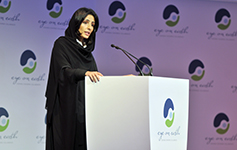The second Eye on Earth Summit (Eye on Earth 2015), which convened under the theme, ‘Informed Decision Making for Sustainable Development,' detailed a package of mechanisms, recommendations and practical actions to improve the collection, access, sharing and use of data and information in support of the 2030 Agenda for Sustainable Development.
 8 October 2015: The second Eye on Earth Summit (Eye on Earth 2015), which convened under the theme, ‘Informed Decision Making for Sustainable Development,’ detailed a package of mechanisms, recommendations and practical actions to improve the collection, access, sharing and use of data and information in support of the 2030 Agenda for Sustainable Development.
8 October 2015: The second Eye on Earth Summit (Eye on Earth 2015), which convened under the theme, ‘Informed Decision Making for Sustainable Development,’ detailed a package of mechanisms, recommendations and practical actions to improve the collection, access, sharing and use of data and information in support of the 2030 Agenda for Sustainable Development.
The Summit convened from 6-8 October 2015, in Abu Dhabi, United Arab Emirates (UAE), under the patronage of Sheikh Khalifa Bin Zayed Al Nahyan, President, UAE, hosted by Razan Khalifa Al Mubarak, Secretary-General of the Environment Agency – Abu Dhabi (EAD), and overseen by the Eye on Earth (EoE) Alliance, a collaboration of five core organizations, namely EAD’s Abu Dhabi Global Environmental Data Initiative (AGEDI), the UN Environment Programme (UNEP), the Group on Earth Observations (GEO), the International Union for Conservation of Nature (IUCN) and the World Resources Institute (WRI), and many partners.
Al Mubarak said the Summit’s outcomes are “central to advancing Eye on Earth’s vision of achieving a world where environmental and associated social and economic information, combined with citizen engagement, improves decisions leading to sustainable development.” UNEP Executive Director Achim Steiner said, “We have a collective responsibility to make sure that this agenda is delivered. Getting citizens and businesses to engage in this global agenda will be vital.”
The Outcome Document from the Summit recognizes that reporting on the Sustainable Development Goals (SDGs) requires a diverse range of data, engagement with a wide array of stakeholders to manage data, and capacity building and technological support. It presents action-oriented statements supporting informed decision making for sustainable development on: data needs of policymakers; capacity building for the SDGs; the data revolution; technology support; inter-regional knowledge sharing; Arab region data needs; data issues for small island developing States (SIDS); polar and cold regions; building knowledge for healthy lives; and the Principle 10 Action Plan.
The Outcome Document suggests the need to include citizen-science data in reporting on the SDGs. It relays the forthcoming establishment of a global coalition of citizen-science groups.
It also recognizes at least 20 proposals for Special Interest Groups (SIGs), including: regional SIGs; SIGs under the existing SIs; and thematic SIGs.
The Outcome Document also announces that the Alliance will formalize the Eye on Earth Governance Framework and institutional arrangements by the end of 2015, and that the Alliance’s five existing members will enlarge the Alliance strategically by inviting other organizations to join, noting that they have already received five expressions of interest. [IISD RS Meeting Coverage] [Executive Summary of Outcome Document] [UNEP Press Release] [Summit Website]